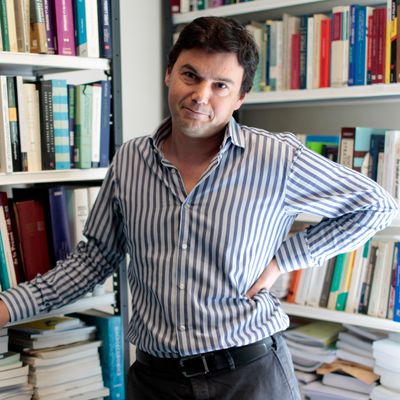
ISIS has many fathers, among them the invasion of Iraq, the Syrian civil war, longtime sectarian rifts in the region, the brutality of the Assad regime, and apocalyptic theology. Thomas Piketty, the famed French academic and author of Capital in the Twenty-First Century, has something to add to the list: economic inequality.
He makes the argument in a new piece for Le Monde, with a hat tip to Jim Tankersley for finding it. “It is obvious that terrorism feeds on the Middle Eastern powder-keg of inequality we have largely contributed to create,” Piketty wrote in French. “A minority of people in the oil monarchies [have] appropriated a disproportionate share of the windfall, while large groups (including women and migrant workers) are kept in semi-slavery. And it is these regimes that are militarily and politically supported by the Western powers, too happy to … sell them weapons.”
It feels a little like Baader-Meinhof might be at work here: Study inequality for years and years, and you just might end up seeing it everywhere. (Perhaps taxing capital gains as regular income and unconditional transfers might be just the policy salves that Syria and Iraq need!) And skepticism about the editorial has abounded. Tim Fernholz at Quartz, for instance, cited the work of Alan Krueger, the Princeton academic and former Obama official, and Czech economist Jitka Maleckova showing no link between poverty and terrorism.
But poverty and inequality are very, very different phenomena. And there is a body of research linking that latter economic condition to higher levels of terrorist activity and to violent crime in general, with academics arguing that “conflict [could result] from frustration over the actual distribution of economic resources within a society.”
There’s also related research showing how social exclusion helps to foment terrorism. “Belgium has a very elaborate welfare state. All citizens have health coverage, schools and universities charge no or few fees, child benefits, unemployment benefits, pensions, are all in place,” writes the economist Philip Verwimp. “But this comes at a cost of a closed labour market, meaning a labour system that heavily protects those who are in, but makes entry for newcomers very difficult.” That country’s solution to end poverty might help to explain why so many of its young citizens are fighting for ISIS, in other words.
Piketty argues that Western countries should battle such exclusion and inequality, at home and abroad, to help in the fight against terrorist organizations. Countries like Belgium and the United States should focus on social development, pressuring countries like Saudi Arabia to spend their oil money on education and welfare. Countries like France should stop austerity budgeting, tackle discrimination, and better integrate immigrants, he argues.
Leaving aside the question of how much inequality has contributed to the rise of ISIS — and how to extricate economic inequality from the brutal political realities in the Middle East — that certainly seems like good advice.





























